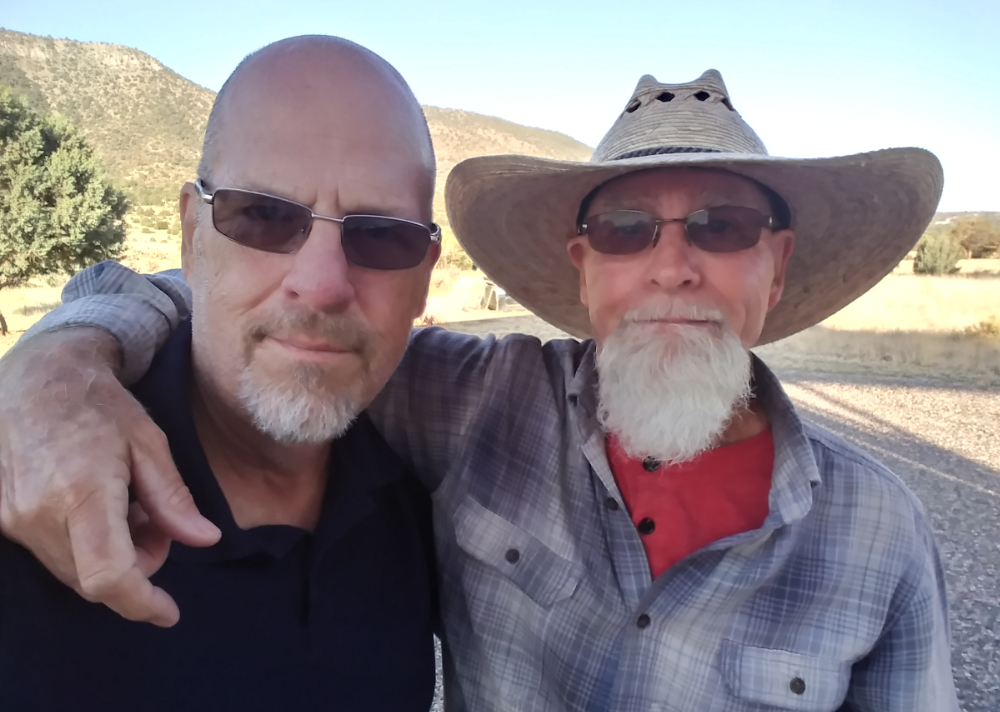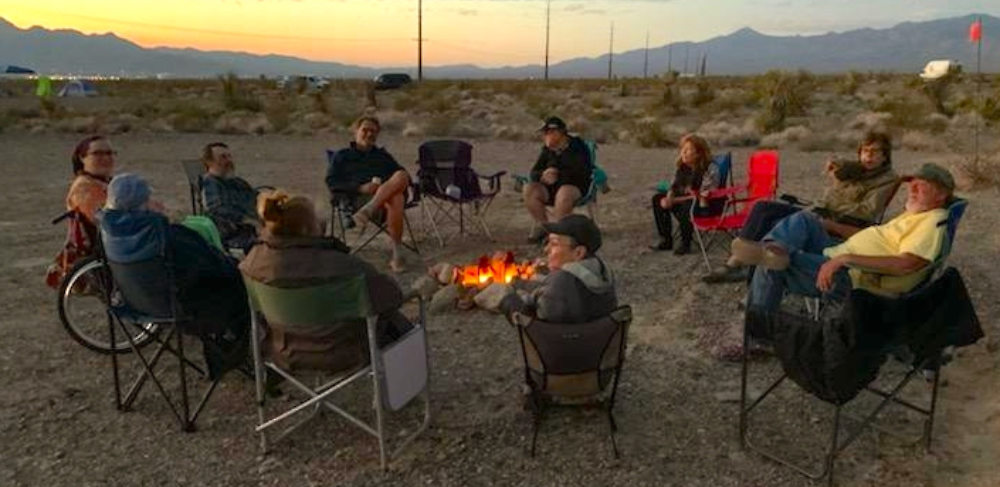WE NOMADS (particularly we of the gray hair and wrinkles set) are often asked by concerned non-nomads, “But what will you do when you become too old or sick to care for yourself?”
I usually answer, “The same thing you’ll do when you become too old or sick to care for yourself: make other arrangements.”
The question assumes we nomads are the ones who will need help and that living in a building will somehow hold decrepitude at bay. But I’ve been off the road since March to help out my sick ex-nomad best friend.

He has a heart condition, lung cancer, and digestive problems. He has lost a lot of weight and muscle. He’s weak and fatigued and anxious. Like me, he has no children or close relatives, not even a former wife. His many friends are scattered around the country, and I usually am as well. But I’m with him now. Because I can be. I’m not anchored to a home and family, so I can pick up and go to him and stay as long as necessary.
Friends are more important
There are elderly people living in buildings in the middle of population centers who are just as isolated as those of us alone in the boonies. They might be closer to medical care and social services, but do they have anyone to check in on them, prepare meals for them, run errands for them, take them to medical appointments? Do they have someone to talk to? I think those things are more important and harder to acquire, no matter what you live in.

I tend toward reclusiveness, but I understand the value of good friends. So while we’re out exploring the land, gathering experiences and memories, we should also gather a few true, reliable, benevolent friends. That’s one reason for nomad gatherings like Rubber Tramp Rendezvous, Women’s RTR, and the HOWA caravans. They increase your opportunity for meeting new people. Perhaps one will become your best friend ever — the one who will come running, or the one you’ll gladly run to. Wherever you are.

Thank you for this insight. I am 81 helping my 91 year old friend with shopping and small tasks. I have no family that could help me when I need it. Close friends are the best answer. Bless you for helping your friend in his time of need.
We are all getting old I’m 71 and love to get out but I nap a lot and take it easy.
I have worked with the elderly for many years and I can honestly say that I believe that if you can become a nomad you will live a richer life than living a life in a nursing home. Most people living in a nursing home or in their own house or apartment live a very lonely life. Living a nomad life seems to bring in new and unexpected friendship because you are out there meeting new people. In other words you are living your life instead of just waiting in a room to die. I am hoping to become a nomad sometime next year.
I believe being outdoors keeps us healthier. It has been the case for me, anyway.
That is an absolute truth for me. I live outdoors and I am much healthier, am still overweight but much less overweight. My two dogs are the happiest dogs in the world. I have met people lately that are of higher quality than I have experienced in all my previous years. I am 65 and healthy. I have time to reestablish myself among good people. I am not going to waste the opportunity as I wasted multiple opportunities when I was a foolish young man.
“I have met people lately that are of higher quality than I have experienced in all my previous years.” I’ve known some high quality people in my life, but they were rather scarce. They seem a lot more plentiful in the nomad community.
The comments enhance every word you wrote. Thanks for putting this issue out there for all of us.
Thanks Al for your perspective on creating family. I also don’t have children and reached 58 years. I have seen in RV Adventure Club magazine RV parks advertised for seniors. The RV parks for seniors advertised is less expensive than the traditional assisted living facilities. When it comes time to transition from the RV senior park to nursing home – Medicare comes to mind. They smell and so-forth. On the other hand, when a person moves to a nursing home death is normally around the corner.
This was one of the best articles. Thank you! God Bless You for being there for your friend! I have
taken care of friend and family members, it is very important to be there for them. I feel the
outdoors and fresh air and friends are so important and make a big difference. One’s in
nursing home or confined to home have no life, so give up way to soon. Myself I know
and have experience it all, I love living out in wide open spaces. I will as long as I can, I’m 74 and
very happy.
Nice. Those lovely friendships are gold. I am grateful everyday for them. I look forward to meeting more friends in the nomad world. I’ve already started several new nomad friendships and I haven’t even been in the southwest yet with my rig!
Beautiful and very sweet post. Also the “God’s Honest” and best “common sense” post ever. We all have to think about our demise. We all think about our eventual end. We all think about how we might possibly soften the blow. Again, great post.
Well no one is promised tomorrow. Live for today and live the nomad life if you choose. We all need a social life to be healthy and balanced.
Just enjoying nature alone will extend a person’s life span and one can feel happier and more contented, I believe. Thanks for your perspective Al.
Thank you for this heartwarming post and comments. I am coming to terms with being forced to become a nomad. It’s overwhelming and fearful. As many of you may’ve experienced, family and friends scatter when one has become homeless and they’re afraid of being asked for anything. I’m independent and yet at the same time I do need a little support. People are often scared by what they don’t know haven’t experienced and judge through that ignorance. So I forgive them and move on. I’m not a victim and rarely ask for help . I don’t have a vehicle and have a little bit of money to find the most purposeful vehicle for my situation. Although you wouldn’t know by looking at me, I’ve physical disabilities and being cramped up in a vehicle is scaring me especially in the winter when pain increases and the need to move around is necessary to manage it . I have till the end of the year to move out . I think a van might work best for me. I don’t know who to trust with buying a vehicle, and am not familiar with driving around the state or the country. Any suggestions please and thank you! I found myself crying reading through some of these articles and the comments because I’ve never seen a community with so much support. Bless you all!
I’ve been disabled with Lupus since 2016 and having a roof over my head has been difficult. I’m 61 and have many meds which mean, for now I need to be able to access my doctor every 3 months. I think you would find malls or anywhere to walk for that manner. I’ve just started looking into this. And you are right, if you have no family, and friends have moved on since I’m limited to what I can do, well the video’s I’ve seen everyone is smiling. I work as a pet sitter which is a must to keep a roof over me. I think the good Lord has answered prayers. Cutting out $1000/month would be incredible. I’m Canadian, travel isn’t covid friendly here, nor are -30 below either. But I’m now going to work towards this for spring.
“A friend in need is a friend indeed”….kudos to you.